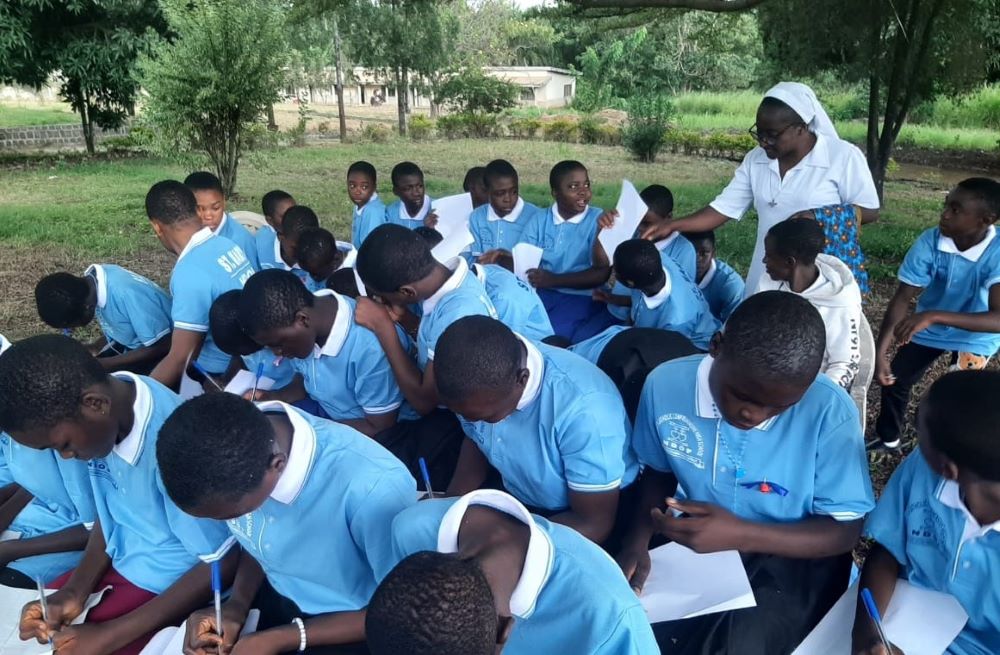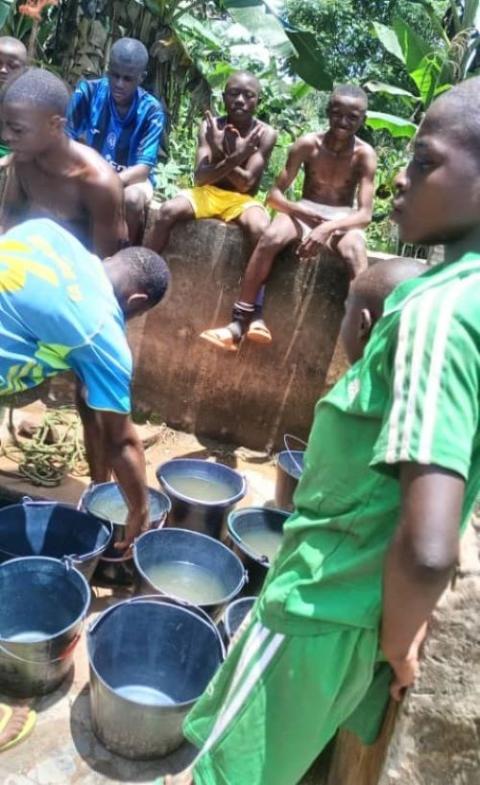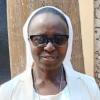
Students take exams outdoors at St. Mary's Comprehensive High School in Ndop, in the central northwest region of Cameroon. Holy Union Sisters say that despite challenges related to the ongoing separatist conflict, most students in their schools have passed exams. (Courtesy of Josephine Nko Ndindi)
During a Wednesday appearance in Rome, Pope Francis told the audience that it is important for all of us to pay attention to the moments of hope and joy rather than being caught up in the dramatic negatives that swirl around and among us. The joy of the Gospel brings peace and hope that is always present for us to discover, even though its light may be more subtle and unnoticed.
As Holy Union Sisters in Cameroon living in the conflict areas of our country for the past six years, we experienced joy and hope as the 2022-23 school year came to a successful end. We and our lay teachers lived out our faith journey and shared our mission of education, standing firm in our commitment to our children while facing many challenges.
First, we are grateful that our students and teachers were protected from harm and able to go without undue harassment to three of our schools in the northwest and the east area of Cameroon near the Central African Republic, Yokadouma and Massea. The Cameroon government neglects this region, Yokadouma in particular. Roads and other infrastructure are nearly inaccessible. There is poor electricity and water. Here, women are still regarded as second-class citizens. Many girls are still kept out of school and instead given in marriage at the tender ages of 13 or 14.

Students draw dirty water from a rain-soaked well at a school in Cameroon. (Courtesy of Josephine Nko Ndindi)
We stand with and for these young girls, searching them out and doing all we can to get them to school. We are proud of one of them who is the best student in La Sainte Union School in Yokadouma. She scored excellent results in the Cameroon General Certificate Ordinary level final exams. Thankfully, others also did well throughout this past year, with 100% of the students in both primary and secondary schools passing exams. The advanced level examinations were equally very good in all our schools, with 95, 98 and 100%t.
Military and separatist groups were quieter in the northwest regions of our country this past year. This enabled our St. Mary Comprehensive High School students in Ndop, located in the central northwest region of Cameroon and most affected by the Anglophone crisis, to rejoice in good exam results. With more peace, the students achieved higher marks than in the previous year. It is a good sign for us that perhaps life is coming back to normal. We can only hope this is true.
Since the war began six years ago, the people of this area have lived in such constant tension and fear that Mondays are designated as "ghost days." All shops and markets are closed on these days, and no one leaves their homes. The only cars on the road are those of the military and motor bikes of the Amba Boys, called such by the local people and members of the local separatist group.
On other days, shops are once again open, people move about and students go to school, although caution prevents them from participating in outdoor activities.
People do not attend national day celebrations like youth day, fearing possible attacks. Even now, although things feel somewhat better, no one is sure that the environment will remain safe. Every day, people remain anxious about new attacks.
Another of our many challenges during this year at St Mary's is the increase of students to nearly 1,000. Our former school and others were destroyed or have become dilapidated from lack of maintenance, making it impossible for school sessions to be held in some places. So, we had to move to a different place that was smaller. Because of this, many classes were held outdoors in the open air.
A further challenge we faced here and elsewhere is the inability of students to pay fees, afford books and even have food. Nearly 400 St Mary's students come from families suffering severe loss of income. Parents cannot go to work as usual and cannot go to their farms to cultivate and sell vegetables and fruits. The situation makes it very difficult for the school to function financially and pay the teachers who have been generous enough to teach without a salary for several months.
Advertisement
On the other hand, we have been fortunate that we continue to have donors from the United States that send us scholarships for a few students to help us in our education mission. The donations provide school fees for some students. While there may be occasional access to food, more often, students arrive at school for classes at 7:30 a.m. and leave at 3:30 p.m. without having anything to eat.
Without access to good nutrition and due to the insecurity of these past few years, during which students could not attend school at all, they are falling behind in their academic achievement. While we are trying to help this situation by offering extra classes, without reliable, regular and safe transportation, having children stay later is not the best option.
Food insecurity remains a pressing issue in most areas of Cameroon, with low production. Challenging transportation due to bad roads leads to very high food costs.
In spite of these many challenges, our teachers and all of us sisters try to live out the Gospel values and our Holy Union charism, which calls us to "be at the heart of the world, revealing God's love" and to "speak for the voiceless and stand with the marginalized of our society and the world. " We can only hope that the war that continues to wreak havoc in our lives will soon be over and peace will come. We pray for that and ask for prayers of solidarity as well.







